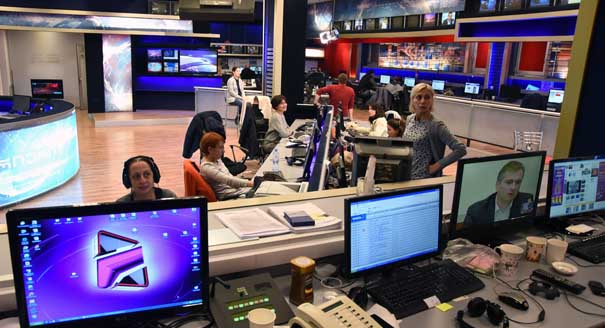On the night of November 5-6, Georgians experienced déjà vu.
Hundreds of protestors turned out to support Rustavi-2, the television station that attracts the most viewers in Georgia, after a judge ordered that it be restored to its former owner Kibar Khalvashi.
The order was issued in the middle of the night without allowing an appeal process to run its course. It was full of legal holes, as a detailed statement by Transparency International points out. Quite clearly, this was an attempt by the Georgian Dream government to take over a channel that broadcasts opinions sympathetic to the country‘s former ruling party—and main opposition movement—the United National Movement (UNM), still led by ex-president Mikheil Saakashvili.
Just as in Russia in the eras of Mikhail Gorbachev and Boris Yeltsin, television has been key to the survival of democracy in Georgia by airing alternative views to the government—and frequently incurring its wrath.
Much of the journalism has been polemical and not of high quality, but that is not the issue. Media pluralism has helped Georgia to mature into a more grown-up and democratic state than its neighbors.
Rustavi-2 has had a stormy history and its multiple changes of ownership are indeed worthy of scrutiny. Back in 2001, it was also a pro-opposition channel, airing programs critical of then Georgian president Eduard Shevardnadze. When law enforcement officers tried to shut it down for alleged tax irregularities, crowds gathered to support the station and Shevardnadze backed down.
This was also the moment whan former justice minister Saakashvili upped his profile as an opposition politician, flying back from Ukraine to join the protests. Two years later, Rustavi-2 broadcast information that the 2003 parliamentary election had been falsified, helping to trigger the Rose Revolution, which brought down Shevardnadze.
Elected president, Saakashvili then turned Rustavi-2 into a pro-government channel, albeit one with slick and professional production values. His own turn to a more authoritarian style of rule and political decline can be linked to his attempts to control broadcasting. In 2007, he forcibly took over Imedi, a station that defied him. Ahead of the parliamentary elections in 2012, his government did its best to suppress the small Tbilisi channel Maestro, impounding thousands of satellite dishes through which it planned to expand its coverage across Georgia.
The assault on Rustavi-2 augurs badly for Georgia as it goes into an election year.
Politics seems to be stuck on a recurring loop from 2012. The election of that year was a contest about the future of Georgia. But unfortunately it was also a titanic clash of egos between Saakashvili and the leader of the opposition, billionaire Bidzina Ivanishvili.
That feud carries on, to the detriment of Georgia, even with Saakashvili now installed as governor of Odessa in Ukraine.
Ivanishvili’s Georgian Dream has done many positive things since coming to power. But it has lost popularity by failing in its chief mission, which was to revive the economy and create jobs.
Justice Minister Tea Tsulukiani has cleaned up the abusive justice system erected by her notorious predecessor Zurab Adeishvili. (Adeishvili fled the country in 2012 and is unfortunately now working for Saakashvili in Odessa.)
The rule of law is stronger, except in one notable area—a relentless legal campaign against Saakashvili and his party, UNM, which smells of “telephone justice” and political interference.
The collision of the two varieties of justice was on full display in September, when former mayor of Tbilisi Gigi Ugulava was given a four-year jail sentence only a day after the Constitutional Court had ordered that he be released from pre-trial detention.
Saakashvili has not helped his own cause with wild threats against the new government. A telephone conversation, intercepted either by Russians or Ukrainians, revealed him making the threat to use Rustavi-2 to create a “revolutionary scenario” to challenge the government. (This talk of a revolution has put Rustavi-2 in an awkward situation, and as a result they have refrained from calling for mass protests to support the station.)
The Rustavi-2 crisis has already provoked a critical statement from the United States. More importantly, it is a challenge to two men in high office in Georgia, President Giorgi Margvelashvili and Speaker of Parliament David Usupashvili. Both men have voiced reservations about Ivanishvili’s campaign against the UNM in the past and say they want to see a democratic Georgia. At the moment, the politics of vendetta are winning.
